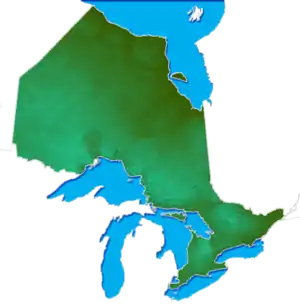Sandbanks Provincial Park
Sandbanks Provincial Park is a provincial park located on Lake Ontario in Prince Edward County near Picton, Ontario, Canada.
| Sandbanks Provincial Park | |
|---|---|
IUCN category II (national park) | |
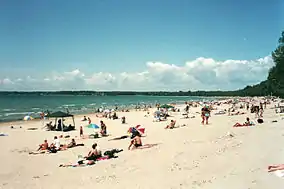 | |
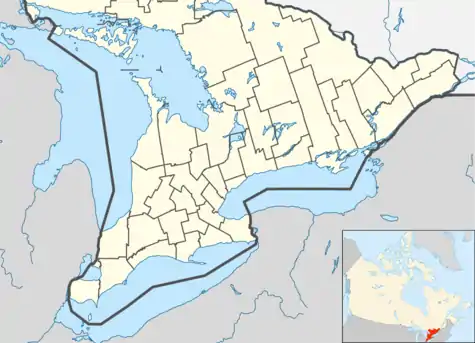 | |
| Location | Southern Ontario, Canada |
| Nearest city | Belleville, Ontario |
| Coordinates | 43°54′N 77°16′W |
| Area | 1,509 acres (6.11 km2) |
| Established | 1970 |
| Governing body | Ontario Parks |
Recreational use
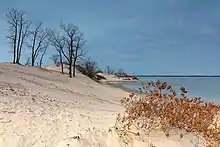
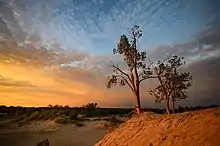

It is noted for its picturesque sand dunes and beaches. It also has the world's largest fresh water sand bar and dune system.
Sandbanks is run by the government of Ontario, with areas for different types of recreation. Some parts of the beach had been bought or settled before the designation of the area as a provincial park, which makes the beaches come in short clusters along the coastline. Naturists have used the beaches for nude bathing for many years.[1][2]
Sandbanks Provincial Park and surrounding beaches are visited by hundreds of thousands of tourists each year. One of sandbanks many beaches is a pet zone, where visitors can bring their dogs. The majority of the tourists come from Ottawa, Toronto, Kingston, New York State, Quebec, and other regions of Southern Ontario.
Sandbanks Provincial Park is one of the most popular parks in Ontario. With 3 beaches (Outlet Beach, Dunes Beach and Lakeshore Beach) and over 600 campsites. Sandbanks offers both non electrical and electrical campsites located all over the park.
County Road 12 in Prince Edward County, stretching from The Outlet, Ontario to Bloomfield, Ontario, runs through the park.
History
The Sandbanks area of the road was somewhat considerable pasture for cattle. By the mid-1850s, the area was changing dramatically. Farmers cut down 200+ year-old trees to clear the land. They built buildings and roads; and in an effort to free up the land to grow crops, farmers allowed their cows to graze on the dunes. The removal of the dunes' natural vegetation meant that there was no longer plants to keep the dunes/sand from shifting across the landscape, burying everything in its path. By the 1880s, considerable roadwork was necessary. In fact, the West Lake road had to be moved three times in a period of 50 years, as the sand kept on burying it. In 1911 they tried to plant White Willow to stop the sand but that did not work. Cotton woods dot the dunes on West lake, and have helped slow erosion. (2019) with higher than normal water levels, many interior walkways and provincial parkland have flooded. Currently, the shifting sand is under control due to natural forest regeneration.
Sandbanks Provincial Park in film and television
Sandbanks stands in for Sable Island in the 2002 made-for-television film Touching Wild Horses, starring Jane Seymour. It also appears in the films Fly Away Home (1996) and Resident Evil: Afterlife (2010).[3] This is also where the music video for the 1985 song "Wave Babies" by Honeymoon Suite was filmed.
Park information
There are two radio stations for travelers at the main entrance to the park.
- 89.5 FM (english)
- 91.9 FM (french)
References
- "A cheeky guide to Ontario's nude beaches". Cottage Life. Retrieved 2015-10-27.
- Woycke 2003, p. 196.
- IMDB
Notes
- Woycke, James (2003). Au Naturel: The History of Nudism in Canada. FCN. ISBN 978-0-9682332-3-8.
